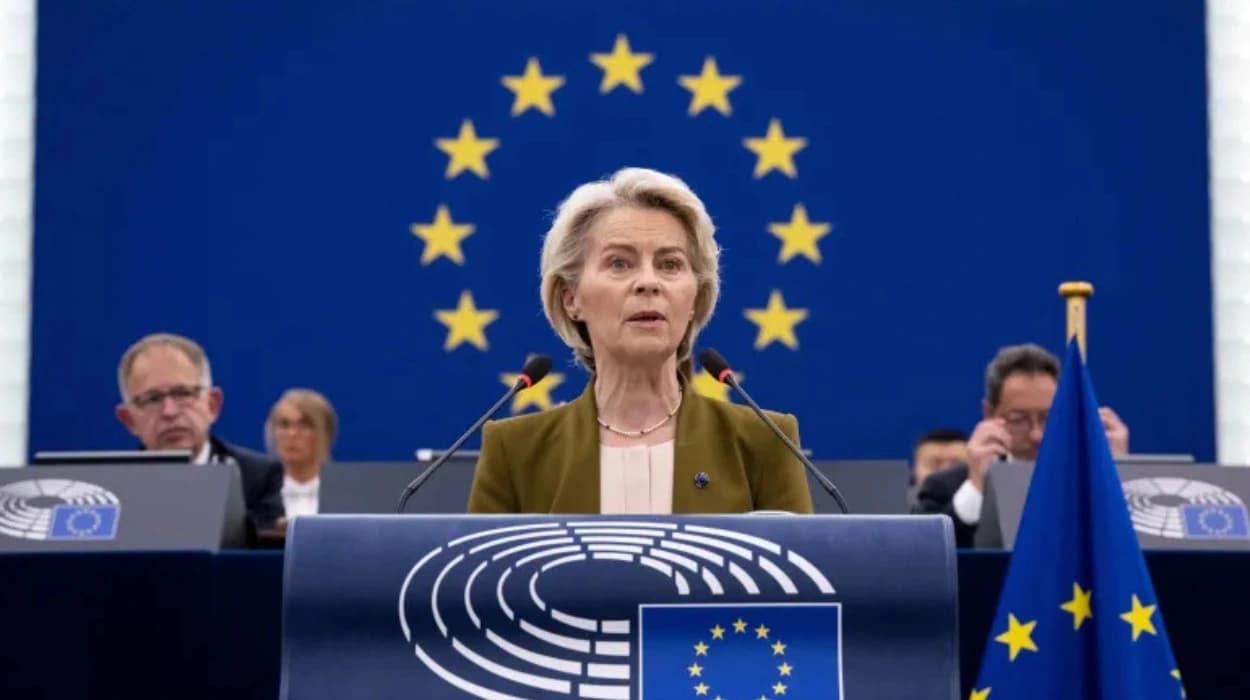European Commission President Ursula von der Leyen has vowed to take decisive action aimed at halting Israel’s ongoing military campaign in Gaza, signaling a pivotal moment in the European Union’s stance on the conflict. Speaking during the annual State of the Union address in Strasbourg on September 10, 2025, von der Leyen described the humanitarian situation in Gaza as "catastrophic" and outlined plans for a comprehensive package of measures targeting Israel’s policies.
Von der Leyen declared,
"What is happening in Gaza is unacceptable. Man-made famine must stop for the sake of humanity and our children."
She underscored the EU’s growing impatience with the deteriorating humanitarian conditions and emphasized the bloc’s responsibility to lead on this urgent issue.
Her announced response includes sanctions directed at extremist Israeli ministers and violent settlers, as well as a proposal to suspend essential aspects of the EU-Israel Association Agreement, which currently grants Israel preferential trade access within the European market.
Sanctions and Trade Suspension Proposals
The package of measures that von der Leyen outlined aims to freeze bilateral support for Israel and impose sanctions on individuals deemed responsible for escalating tensions and human rights violations. The European Commission intends to target extremist ministers within Prime Minister Benjamin Netanyahu’s government, particularly those associated with far-right factions driving settlement expansion in the occupied West Bank.
In practical terms, this could include the suspension of selective trade privileges granted to Israel under the Association Agreement, potentially impacting billions in Israeli exports to the EU, including agricultural products like dates and citrus fruits.
Von der Leyen stressed,
"Europe needs to do more. We cannot turn a blind eye to violations of human rights and democratic values."
She further called for unity among EU member states, warning that member countries must also accept their own responsibilities to act decisively.
Diplomatic and Internal EU Challenges
Despite the Commission President’s firm stance, the proposed sanctions and trade suspensions face significant diplomatic hurdles within the EU. Member states hold divergent views on how hard to pressure Israel, with some like Germany and Italy expressing caution, while countries such as Ireland and Spain advocate for stronger punitive actions.
EU foreign policy chief Kaja Kallas acknowledged these divisions, stating,
"Political divisions within the European Council remain largely unchanged. Yet we must find a strong voice grounded in our values and principles."
The challenge remains to build consensus for these unprecedented measures, especially as they require a qualified majority for trade suspensions and unanimous approval for individual sanctions.
Criticism from Israel
The Israeli government swiftly condemned von der Leyen’s proposals, with Foreign Minister Gideon Saar accusing the EU of unfairly singling out Israel. Saar took to social media to say,
"These regrettable statements amount to supporting Palestinian militant groups, including Hamas. The European Union’s actions are sending the wrong message and embolden terrorism in the region."
Saar emphasized Israel’s ongoing efforts to address humanitarian issues in Gaza and blamed Hamas for the suffering, reinforcing Israel’s narrative that its military operations are a necessary response to terror threats.
EU’s Humanitarian Commitments and Broader Middle East Policy
Alongside punitive measures, the European Commission announced plans to establish a Palestine Donor Group next month aimed at mobilizing resources for Gaza’s reconstruction. Von der Leyen called for an immediate ceasefire and unimpeded access for humanitarian aid, insisting that hostages held by Hamas be freed without delay.
She remarked,
"Our goal is clear: peace and a safe future for all Israelis and Palestinians. Europe has always championed a two-state solution and must now lead the way toward achieving it."
The EU’s renewed engagement develops amid growing public pressure and widespread protests across Europe, demanding governments address what many view as disproportionate Israeli military action in Gaza. The United Nations has classified the humanitarian crisis in Gaza as a potential genocide, which has deepened calls for urgent international intervention.
Legal Basis for EU Actions
The Commission’s proposals rely on the legal framework of the EU-Israel Association Agreement, specifically Article 2, which requires respect for human rights and democratic principles. The European Commission concluded that Israel’s recent actions, including military offensives in Gaza and settlement expansion, constitute violations justifying a partial suspension of the agreement.
This is a rare and significant move, marking a sharp departure from the EU’s traditionally cautious approach to Israel, reflecting growing frustration within Europe at the ongoing conflict’s toll on civilians.
Political Implications and the Road Ahead
Von der Leyen’s speech represents a defining moment for the EU’s Middle East policy, signaling an intention to transition from diplomatic rhetoric to more assertive economic and political tools. However, the likelihood of full approval of the sanctions and trade limitations remains uncertain amid internal EU disagreements.
Foreign ministers meeting in Copenhagen earlier in September grappled with this complexity, balancing solidarity with Israel against the imperative to address humanitarian catastrophes.
Adham Sahloul, a former adviser in the Biden administration, commented,
"Israel’s current course risks alienating regional allies and undermines its standing as a committed partner for peace."
As the EU navigates this critical juncture, its actions will reverberate globally, shaping international response to the Israel-Gaza conflict and testing the resolve and unity of the bloc itself.

